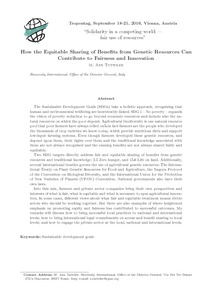How the equitable sharing of benefits from genetic resources can contribute to fairness and innovation
The Sustainable Development Goals (SDGs) take a holistic approach, recognising that
human and environmental wellbeing are inextricably linked. SDG 1 – No poverty – expands
the vision of poverty reduction to go beyond economic resources and include also the na-
tural resources on which the poor depend. Agricultural biodiversity is one natural resource
pool that poor farmers have always relied on in fact farmers are the people who developed
the thousands of crop varieties we know today, which provide nutritious diets and support
low-input farming systems. Even though farmers developed these genetic resources, and
depend upon them, their rights over them and the traditional knowledge associated with
them are not always recognised and the ensuing benefits are not always shared fairly and
equitably.
Two SDG targets directly address fair and equitable sharing of benefits from genetic
resources and traditional knowledge: 2.5 Zero hunger, and 15.6 Life on land. Additionally,
several international treaties govern the use of agricultural genetic resources: The Interna-
tional Treaty on Plant Genetic Resources for Food and Agriculture, the Nagoya Protocol
of the Convention on Biological Diversity, and the International Union for the Protection
of New Varieties of Plaunts (UPOV) Convention. National governments also have their
own laws.
Into this mix, farmers and private sector companies bring their own perspectives and
interests of what is fair, what is equitable and what is necessary to spur agricultural innova-
tion. In some cases, different views about what fair and equitable treatment means divide
actors who should be working together. But there are also examples of where heightened
emphasis on promoting equity and fairness has contributed to successful outcomes. My
remarks will discuss how to bring successful local practices to national and international
levels; how to bring international legal commitments on access and benefit sharing to local
levels; and how to engage the private sector at the local, national and international levels

